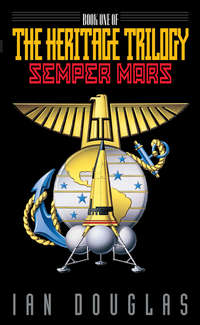
Полная версия
The Complete Heritage Trilogy: Semper Mars, Luna Marine, Europa Strike
“The fact remains, Dr. Joubert,” Dr. Jason Graves added, as Alexander’s outburst subsided, “that you are not in command of the science team here. It happens that I am, and while I will be delighted to have you voice your concerns, the decision as to what may and may not be released to Earth, surely, is something to be determined by the American team.”
“And I submit to you, Dr. Graves, that you are a geologist, an areologist, I should say, and not empowered to make political determinations about data recovered by this expedition.”
“Politics!” Alexander spoke the word as though ridding his mouth of a foul taste.
“Yes, David. Politics! And I have been commissioned by the UN to serve as political officer for the UN contingent. In that capacity, I must insist that you at least listen to what I have to say.”
Garroway exchanged a wry glance with Colonel Lloyd at that. He’d not realized the UN had a commissar on the team.
“And what is so political about what we’ve found?” Alexander wanted to know.
“Tell me, David,” she said after a moment’s pause. “Have you been listening to the news from Earth? It is bad, no?”
“I’m not sure I see how what’s going on back there affects this decision,” Alexander said.
“No? Then I suggest you review the netnews downloads of the fighting in Mexico City, the other day. An American Marine was killed there, I hear. Or the riots in Cairo, in New Delhi, in Tehran, Baghdad. Even in your United States, there are religious or quasireligious sects and factions that would be, shall we say, inflamed by news of what you have found here today. The careless dissemination of information such as this could cause a political and social explosion unlike anything seen before.”
“Oh, come now, Dr. Joubert—” Graves began.
“We already have something like a quarter of the Earth’s population convinced that what we are dealing with here on Mars is somehow demonic, that we are challenging proper beliefs in God, that we are overthrowing the established order, promulgating heretical doctrines, even intentionally corrupting all decent and God-fearing humans. We have another faction, smaller, perhaps, but even more vocal, convinced that the Ancients were gods of some sort who raised us up out of savagery, who gene-engineered our intelligence, who created us, in short. Some want to worship these, these outer-space gods! I tell you, the news that protohumans have been found here, amid the Ancients’ ruins, could lead to a total collapse of civilization.”
“I think you’re overstating things somewhat, Doctor,” Graves said reasonably. “We humans have had our pet theories and prejudices overturned before. We’re adaptable, after all.”
“We may be, yes. But our cultures are not. Civilization is not. Civilization can be remarkably fragile, as anyone who has seen a food riot or cannibalism in a famine-stricken region can tell you. The United Nations World Cultural Bureau is extremely concerned about the threat of worldwide violence, violence precipitated by the irresponsible release of untested data such as this!”
Alexander was shaking his head, a grin on his face.
“What’s so funny, David?” Joubert demanded.
“Ah…excuse me. I was just thinking that the Vatican must have thought something similar when Galileo wanted to publish his observations of the moons of Jupiter. Or when Copernicus published De Revolutionibus. I really thought that humankind had moved beyond such blinkered narrow-mindedness.”
“Not narrow-mindedness, David,” Joubert replied coldly. “Responsibility. There is more here at stake than publishing credits in a science journal…or in making up for past professional mistakes.”
Alexander rose from his seat, and Garroway thought for a moment that he was going to strike the woman. He reached out with one hand and laid it on Alexander’s elbow. “Easy, there, son….”
The archeologist shook the hand off, then slowly, angrily resumed his seat. “That was uncalled for!” he said.
“I think not,” Joubert replied. “You, David, of all people, would want to be careful about the information you present to a waiting world.” She spread her hands. “And…I’m not suggesting anything like a permanent suppression of the data. Simply do me the favor of not making an announcement for, shall we say, forty-eight hours? Let me consult with my superiors in Geneva, and we can talk again after I’ve heard back from them. Two days more to gather further data and evaluate the site. Isn’t that fair? Especially given the importance of this find.”
Graves looked across the table at Alexander. “What do you think, David? We could let her have that much, couldn’t we? We’ll need the time just to write up the reports and to check all of the digital scans.”
“I suppose so.” He didn’t sound happy. Garroway thought that Joubert’s comment about his professional mistakes had touched a very raw nerve.
“Everybody?” Graves asked, addressing the table. “It’s late, and we’re all tired. Is there a problem with waiting two days before announcing this discovery?”
There were murmurs from the others, mostly in the negative. Colonel Lloyd raised his hand.
“Colonel?” Graves said.
“I just wanted to say that…this isn’t a scientific comment, but I do find the fact that the members of an American expedition are deferring to UN personnel with no jurisdiction…disturbing. It sets an unfortunate precedent.”
“In the first place, Colonel,” Joubert replied, “I’m not asking for you to defer to me. I just want a little time to consult with my superiors. Most likely, they will agree with Dr. Alexander, but if there is a problem, they should be allowed to share with us their views, no? As for precedent, I will only remind you that there is every possibility that future expeditions to Mars will be internationalized and, therefore, will come under direct UN jurisdiction and supervision. Your cooperation with my superiors could indeed set a precedent. A good one.”
The meeting broke up shortly afterward. After Joubert and the other UN people had left, Garroway turned to Alexander. “I thought you had something going with Joubert?”
“Not anymore,” the archeologist replied. “That woman is bad, bad news.”
“Looked like you were about to slug her there, for a second.”
“No. I wish…but, no.”
“What was that crack about mistakes? You don’t have to tell me if you don’t—”
Alexander looked up at the doorway through which Joubert had just left. “Oh, there’s nothing secret about it, but nothing really important, either. Let’s just say I’ve crossed swords with some highly placed people before over discoveries that they’d rather didn’t see the light of day. I guess she’s done her research and found out whose toes I’ve been stepping on. I think she’s looking for leverage, some way she can manipulate me.”
Garroway chuckled. “I’ve heard it said that archeologists dig up other people’s garbage. I didn’t know that included skeletons in closets.”
“Quite true. Very old garbage, usually, and you never know where the skeletons are going to turn up. Archeologists are diggers, Major. But sometimes, the things they dig up are inconvenient. Or culturally embarrassing.”
“I’m still not sure I understand why she’s so bent out of shape about this.”
“Mmm. Hard to say, really. She’s right that there are people back home who won’t like what we’ve found here. And others who’ll seize on it as proof that God was an astronaut.”
“Yeah, I was wondering about that. What was that thing about ancient astronauts?”
“Oh, various writers, late twentieth, early twenty-first century, developed the notion that a lot of the strange artifacts and buildings and monuments on Earth couldn’t have been built by primitive peoples…or at least, not by primitives working by themselves. They must have had extraterrestrials helping with antigravity or whatever.”
Garroway laughed. “Seriously?”
“Oh, yes. Quite a few writers jumped on that particular wagon. Erich von Daniken was one of the noisiest. His willingness to attribute every cultural oddity or mystery to aliens pretty well soured the scientific community on the whole idea. Unfortunately, well, the discovery that the Face was an artificial structure of some kind gave an extra boost to his theories, gave them greater credibility. Probably spawned half a dozen star-child religions.”
“You believe this stuff?”
“Mostly, no. Most reputable scientists don’t. The idea was popularized in a number of books, but the information was never scientifically presented, much of it was hearsay, and a lot of the facts were just plain wrong. Hell, back in the seventies, von Daniken’s stuff gave the whole subject such a bad taste that most real archeologists stayed clear of the whole subject for fifty years.”
“No science, all air, huh?”
“Well, the trouble with most of those books was that they usually ignored the simple answer, even ignored the people right there on the spot who could still demonstrate how their ancestors built the whatever-it-was. The Easter Islanders are a great example.”
“I’ve heard about them. Big, stone heads on the beach. I didn’t think aliens were supposed to have anything to do with them. They’re big, yeah, but not so big you need antigravity to explain them. I thought the biggest mystery there was why the things were raised in the first place.”
“With the ancient-astronauts crowd, nothing is ever that simple.” Alexander chuckled. “Sometimes the ancient-astronaut guys really got carried away. One saw aircraft landing strips where the natives had cleared away dark surface pebbles to expose light-colored stones underneath. The Nazca lines, in Peru. They are incredible—huge drawings of animals and figures and geometric lines that can only be appreciated from the air.” He chuckled. “But don’t ever try to land your airliner there.”
“Don’t worry. I won’t.”
“What I always hated about those theories was the way they could so casually dismiss the natural inventiveness, the creativity, the cleverness of us humans. We’ve done some quite spectacular things on this planet, you know, without a scrap of help from aliens with antigravity beams. Most of the evidence offered to support those theories is ambiguous at best.”
“Yeah, but you said ‘mostly, no,’ when I asked if you believed. What part do you believe?”
“Well, you know, sometimes I wonder if we didn’t go too far in chucking everything those writers suggested. There are a few landmarks on Earth that probably weren’t built by the people we’ve always assumed built them, and there’s no decent explanation. The Temple of the Sun at Titicaca is one. The foundation at Baalbek in Lebanon is another. The complex at Giza, the Great Pyramids and the Sphinx, is a third. If aliens didn’t build the things, it’s at least possible they were inspired by, shall we say, visitors from someplace else. If I had to point to specific structures on Earth that I thought gave evidence that we’d been visited in the remote past, I’d point to those three.” Alexander grinned suddenly. “Of course, don’t tell my colleagues that. I’d be black-balled from the Loyal Fraternity of Diggers and Pot-Shard Hunters if they knew. Stripped of my official shovel and whisk broom and drummed out of the corps.”
“My lips are sealed. But tell me, off the record. Is there really any chance that aliens built those places?”
Alexander sighed. “I wish I could tell you. I wish I knew. If I’d been doing archeology in the last century, I’d have to say that the chances were, oh, I don’t know. Five percent. Once we demonstrated that the Face on Mars was no accident of light and shadow, the way they thought when they first photographed it from orbit, well, the chances went up quite a bit, you know? Fifty-fifty, maybe. Or better.”
Garroway blinked. “Why so much?”
“Because now we know that, once upon a time, there were aliens in the neighborhood. We know we’re not alone in the universe, and that one piece of information has already started to change everything about the way we look at ourselves, the way we think about our past and who we are and where we’re going.”
“Oh, I don’t know about that,” Garroway replied. “I think it’s interesting, sure…but you don’t see me joining any aliens-created-Man cults. I think most people will just, I don’t know, accept it and get on with their lives.”
“Maybe.” He didn’t sound convinced. “With me, though, I can’t help it, when I look at the stars now, thinking that there’s some sort of a connection. Between us and the stars. Something more than just the fact that we’re here.”
“Some of those groups back on Earth are claiming that humans are descended from a lost colony of aliens who got stranded here hundreds of thousands of years ago. Maybe what you found out there today supports that notion.”
Alexander laughed. “God, I hope not! That’s one of the sillier ideas being bandied about right now. Man’s place in Earth’s evolutionary tree is very firmly established. Did you know that human DNA differs from chimpanzee DNA by something less than two percent?”
“No, I didn’t know that.”
“It’s true. Doesn’t mean we’re descended from chimps, of course. Just that they’re relatives, with the same great-great-granddad as us. Not only that, but we’re just too well adapted to the local ecology…from what we eat to the symbiotic relationship we have with bacteria in our guts. If early humans had come from another world, well, chances are they wouldn’t even have been able to eat the local food. Even if their body chemistries were based on sugars and amino acids, there’d be just a one-in-four chance at best that they’d be able to digest the stuff they found growing here. Isomers.”
“Isomers?” Garroway made a whizzing motion with his hand above his head. “You lost me.”
Alexander was warming to the topic, growing enthusiastic. Garroway guessed that he was working off frustration accumulated in the meeting. “Some molecules have mirror-image versions of themselves. Same molecule, made of the same atoms, but structurally reversed. Biochemists talk about left- or right-handed molecules. Sugar, for example—we use right-handed sugar. That’s where we get the name dextrose, in fact. We can’t digest levo-sugars. They pass right through without doing a thing, because we’ve evolved to use the right-handed form. At the same time, we use levo-amino acids and can’t digest the right-handed ones. And, so far as we can tell, whether a given planetary ecology evolves with right-handed or left-handed isomers of all the various organic molecules is purely a matter of chance. Toss a coin.”
Garroway nodded. “Which is why you say we have a one-in-four chance of finding dextro-sugars and levo-amino acids on a new planet.”
“Right. And that’s just for starters. There’s also the problem of long-chain proteins that—”
“Whoa!” Garroway said, holding up both hands. “I never got beyond high-school chemistry. Organics leave me whimpering and sucking my thumb. But I get the idea. Humans may have picked up some hints and tips from aliens, but we ain’t the aliens.”
“Eloquently stated, Major. I just wish we could find what the true extraterrestrial connection was.”
“Maybe we’re about to find out,” Garroway said.
“I know we are, Major. We’ve just scratched the surface.” He pointed at the floor. “The answers are here, under our feet. And I’m going to find them.”
Garroway was impressed by the man’s determination, the sheer will in his voice. “Yes, Dr. Alexander. I think you are.”
“And Mireille Joubert and her World Cultural Bureau and the whole damned UN can go to hell.”
They left the rec area together.
1039 HOURS GMT
Communications Center
Cydonia Base, Mars
2253 hours MMT
Cydonia Prime’s communications room was located in a partitioned-off portion of the command center. There wasn’t much to see there—the computers used to maintain communications between people on surface EVA or in the Mars cats, the main workstation with a direct uplink to the areosynchronous comsat, and another unit that maintained a constant open channel with Mars Prime, again through the comsat. During the day, when teams were working out on the surface, the comm center was a busy, even a crowded place, but no one ventured out onto the surface during the night, when the outside temperature plunged to minus one hundred twenty Celsius or lower. A communications watch was maintained through the night, of course, with personnel rotating down the watch list from both the NASA crew and the US Marines.
A Marine was on watch this night, but that didn’t bother Dr. Joubert. She smiled as the young man handed her a hardcopy printout. “Here ya go, ma’am.”
“Thank you, Corporal.” Turning, she walked through the partition door into the main command center. There were three or four people there, either on duty or chatting. Colonel Bergerac was waiting for her by the door.
“Colonel?” Joubert handed him the hardcopy. “It seems we have our reply.”
Bergerac’s bushy eyebrows raised as he accepted the sheet and glanced at it. ALPHA APPROVED IMMEDIATE was all it said.
“That was fast,” he said. “Scarcely time for the light lag.”
Earth and Mars were currently five light-minutes apart. The query, coded and inserted in the normal outbound comm traffic, had uploaded at 2136 hours. It would have reached Earth at 2141. Valle and the others must have been waiting right there at the Geneva command center to have made their decision and relayed it back in less than an hour.
“Soltime tomorrow,” she said. “That will give our people at Candor time to get ready.”
Bergerac nodded. “It will be good to have these American Marines out from underfoot,” he said.
TEN
Mars Expedition/Communications: Reliable communications are vital for the safety, efficiency and productivity of the mission, and Spacenet has been adapted to the purpose. Established in 2024 as an extension of the existing Internet, Spacenet provides both broad- and narrow-band data transmission, including graphical and video interfacing through the World Wide Web. Primary Earthside nodes include the AI systems at Kennedy and Vandenberg Spaceports, as well as the Marshal, Johnson, and Greenbelt Space Centers. Spaceside nodes include the AI systems of each of the manned space stations, with the primary node in the ISS, as well as the Fra Mauro Node on Luna. All Mars communications are currently relayed through a PV-10K communications satellite in areosynchronous orbit. A secondary relay is located in the old MSC-1 system on the inner Martian moon, Phobos—currently inoperative.
—Download from Networld Encyclopedia vrtp://earthnet.public.dataccess
SUNDAY, 27 MAY: 1159 HOURS GMT
Cydonia Base, Mars
Sol 5636: soltime +13 minutes
MMT
It was just past midnight, the time of the day reserved for the so-called soltime, the extra forty-one minutes and some odd seconds that brought the human reckoning of time by hours, minutes, and seconds into line with Mars’s longer rotational period. Garroway had been planning on hitting his rack early, but he was on edge and sleep eluded him. It had been a long day—most of it spent in a long series of diagnostics with the EVA suits used by Alexander, Kettering, Pohl, Druzhininova, and Vandemeer when they’d made their discovery at the Fortress the day before. All five suits had flagged red in pre-EVA checkout. With the chance—admittedly remote—that something about the site had somehow affected the suits, no one was being allowed to return to the site until it could be checked out remotely, and that was going to take time. There’d been nothing wrong with the suits that he could determine.
Alexander had been furious, convinced that Joubert or one of the UN people had sabotaged the readouts to keep them from going back to the Fortress site.
The possibility that the expedition could be torn apart by internal dissension or even UN sabotage was a serious one; building psychological pressures within any small group of mismatched people cooped up together far from other humans had more than once led to disaster.
Unable to sleep, Garroway walked over to the comm center, where he commed a long vidmessage to Kaitlin. After uploading it onto Spacenet, he went back to the command center, poured himself a cup of coffee at the mess, and sat down at a spare console seat with Dr. Graves and Corporal Phil Hayes, who had the communications mid-watch. Hayes stood as Garroway came closer.
“At ease, at ease,” he said. “What’s the good word?”
“Hello, Major,” Graves said. “The corporal was just telling me about the problems you Marines are having on Mars.”
“You having problems, Corporal?” Garroway asked.
“No, sir!” the Marine snapped back, resuming his seat but managing to remain at attention.
“It’s okay, son,” he said. “I’m not your CO, and I don’t bite. What’s the trouble?”
“Well, sir…the sand is hell on the rifles. It’s more like a real fine dust or windblown grit, y’know? Gets into everything. Coats everything, worse’n mud.”
“Which is why all of the weapons-cleaning drills on the way out, right?”
“Roger that, sir. Then, on top of that, some REMF back on Earth recalibrated all of ATARs, so we couldn’t hit shit when we started range practice last week. We had ’em set for Mars gravity, y’know? Then when we started workin’ with ’em here, we kept hitting above the bull’s-eye. I thought old Lloyd and Master—uh, I mean—”
“That’s okay. Go ahead, Marine.”
“Uh, I thought the colonel was gonna shit, sir. We were all selected for this mission, y’know, on the strength of our quals Earthside, and it was looking like we were the worst damned shots in the Corps.”
“You get that straightened out?”
“Oh, sure. It was pretty obvious what had happened. You know, no one in the Marines, no one in the ranks, anyway, likes these new electronic rifles. Too much gadgetry screws things up, y’know? Give me a rifle you could sight in with a sandbag and a screwdriver, like in the old days.”
Garroway chuckled. Hayes looked too young to reminisce about “the old days.”
“I was telling him,” Graves added, “that it sounded like someone on Earth got his sums wrong.”
“Exactly what I was thinking,” Garroway said. The M-29 ATAR was designed to accept PAD entries feeding it data such as air pressure, altitude, cartridge size, and gravity in order to precisely sight the rifle—supposedly a big improvement over the old-fashioned chore of taking it out to the range and sighting it in manually. “The gravitational acceleration on Earth is 980 centimeters per second squared. On Mars it’s, what?”
“Three seventy-one and a bit,” Graves said. “About a third.”
“I can see how that would throw your aim off. Some supply officer probably looked at that 371 centimeters per second squared, said, ‘Hey! This can’t be right!’ and changed it.”
“Every rifleman ought to be responsible for sighting in his own weapon,” Hayes said in the matter-of-fact way that professionals have when they discuss their tools. “Leave it to some supply officer back on Earth, and, see what happens? If there’s a way to fuck it up, you know they’ll find a way to do it.” He didn’t specify who they might be, but Garroway understood the feelings every soldier of every time and nationality had for the bureaucrats and bean counters behind the lines.
“You know,” Graves added, “I’m reminded of something I read about the early space-station designs. The US Skylab, put up way back in the 1970s…apparently the crews had some real problems because the engineers back on Earth kept forgetting that there was no up or down in space. And these people were designing a space station, for chrissakes!”
“It’s hard to shake our Earthbound prejudices,” Garroway agreed.
“Tell me about it, sir!” Hayes said, laughing. “Didja hear about the boots?”
“Nooo….”
“Some idiot, probably the same ROAD-SOB who fucked up the rifles, must’ve seen we were headed for a desert environment, ’cause he also saw to it we had thirty pairs of Boots, Mark I Desert, Marine Issue, Standard.”
Garroway’s eyes widened. “Desert boots? On Mars?”









